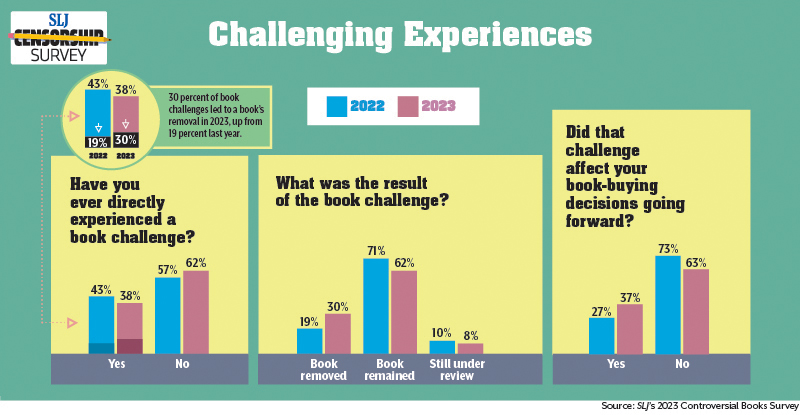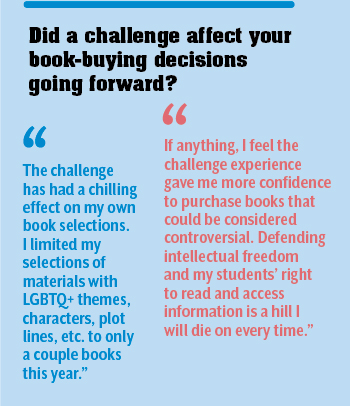Book Challenges Are Having a Chilling Effect on School Librarians Nationwide | SLJ Survey
Thirty percent of challenges led to a book’s removal in 2023. And while 34 percent of librarians who experienced challenges have considered leaving the profession, 65 percent are motivated to fight censorship.

The surge in book challenges nationwide is having a chilling effect on school librarians, who are more likely to avoid buying books or to remove titles from collections because of their content than they were last year, according to SLJ’s 2023 Controversial Books Survey.
Thirty-seven percent of librarians said book challenges influenced their purchasing decisions for the library, up from 27 percent in 2022, an effect that spans all grade levels. Twenty-four percent of respondents said they’d experienced harassment over books or displays in their library.
And while the percentage of U.S. librarians who have experienced a book challenge dropped from 43 percent to 38 percent, 30 percent of those challenges led to a book’s removal in 2023, up from 19 percent last year. Urban school librarians were the only segment to report a rise in book challenges, from 31 percent in 2022 to 39 percent this year.
Perhaps in response to the spike in challenges, 55 percent of respondents said their school’s book challenge procedure was new or revised, an increase from 49 percent in 2022.
The number of librarians who voluntarily removed books from their library also rose, from 42 percent in 2022 to 47 percent in 2023.
All 729 respondents are responsible for selecting books for their library. Their most cited reason for choosing not to buy a book was sexual content, especially at the high school level—increasing from 60 percent in 2022 to 75 percent in 2023. As for other concerns, 43 percent said profanity or vulgar language caused them to reject a book, while 37 percent named LGBTQIA+ content.
 Age-appropriateness was also a top issue for respondents while purchasing. “It’s extremely hard to determine age-appropriateness in reviews because they do not state how much profanity or sexual content the book contains,” said a librarian in Oklahoma. “Reviewers must do a better job if librarians are to rely on professional reviews.”
Age-appropriateness was also a top issue for respondents while purchasing. “It’s extremely hard to determine age-appropriateness in reviews because they do not state how much profanity or sexual content the book contains,” said a librarian in Oklahoma. “Reviewers must do a better job if librarians are to rely on professional reviews.”
“LGBTQIA+ content is really, really frowned upon in my district,” wrote a librarian in Missouri. “I buy them, but I do so selectively and focus on books where kids/parents are coming to terms with their sexuality. I do not purchase books with LGBTQIA+ romance.”
Books with LGBTQIA+ characters and/or sexual content that respondents declined to buy include All Boys Aren’t Blueby George M. Johnson, Gender Queer by Maia Kobabe, Heartstopper by Alice Osman, This Book Is Gayby Juno Dawson, Melissa(previously titled George) by Alex Gino, Drama by Raina Telgemeier, Colleen Hoover’s books, and Sarah J. Maas’s “A Court of Thorns and Roses” books.
Of Gender Queer, one Texas respondent said, “It drew such a red flag in Texas that I made the decision it wasn’t worth the risk of bringing a spotlight to other similar titles.”
Another Texas librarian said, “I had to remove George at the request of my superintendent. No challenge had been brought forth.... [District librarians] have been directed to look closely at our collections, especially any books on the BookLooks website,” a book ratings site used in challenges that has been linked to Moms for Liberty.
In other cases, books were removed because of outdated or objectionable content. “I inherited a very dated collection that had not been weeded for a long time,” commented a Minnesota respondent. “I spent a lot of time at the beginning of this year removing books with harmful stereotypes or outdated language/beliefs.”
Many librarians opted not to buy a book because they were worried about the reactions from parents or the wider community.
“Other librarians in my district are self-censoring because they are afraid of parents,” a California respondent wrote. “Their rationale is that kids can get ‘controversial’ books at the public library. They are forgetting that there are controlling parents out there who monitor their kids’ library accounts and computer search histories, opt them out of health lessons about sexual or reproductive topics, and generally monitor what they read at home.... There are also kids whose parents don’t have a car.”
Others cited state or local legislation as a roadblock to acquiring books—14 percent, up from six percent in 2022. “In our current political climate, the loud few are driving laws that govern our school libraries,” said a Florida librarian.
“You hesitate about everything,” commented an Iowa respondent. “Iowa has a new book law our governor is about to sign that says K–12 schools may not have any books that contain sex acts. This will take out many of our AP Literature titles.”
Regional patterns
Book challenges varied by region. According to respondents, small towns and rural areas in the Northeast saw a jump in challenges from 2022 (43 to 47 percent), as did urban areas in the Northeast (22 to 46 percent) and South (32 to 47 percent).
The majority of book challenges, 78 percent, come from parents.
 “We had a parent and student teacher object to and challenge 96 graphic novels with one email and ten pictures,” reported a California librarian. “She did not read them. Just took pictures of pages and complained about what was on them. I wrote a five-page report on my findings and sent them to the library and the admin in question. [The] books remained available for checkout throughout the process.”
“We had a parent and student teacher object to and challenge 96 graphic novels with one email and ten pictures,” reported a California librarian. “She did not read them. Just took pictures of pages and complained about what was on them. I wrote a five-page report on my findings and sent them to the library and the admin in question. [The] books remained available for checkout throughout the process.”
“I had two parents direct their challenge on the community Facebook page instead of coming to me first,” wrote an Indiana librarian. “The first parent took it a step further once I removed the book and confronted me in the library without administration knowledge.”
“A parent challenged a book that I never purchased and had never been in my collection. They do not believe me,” said a respondent in New York.
Sometimes the challenges come from an organization or from school staff. “My principal removed three books last school year without a formal challenge, against my own protests,” said a librarian in Washington State. “The district supported her on this, despite their policies saying otherwise. When the public learned of this, the books were returned to the shelves while the formal challenge went forward.”
Some respondents saw challenges as a teaching opportunity. A librarian in Washington, DC, teaches a unit about banned books. “Throughout the year, I revisit the idea of banned books and encourage kids to read about new ideas that may present a ‘challenge’ for them, opening their eyes and minds to those of other people and other ideas. The moment we close our eyes to the beauty of vastness that people are, we close our eyes to the possibility of equality for all.”
Such challenges have also prompted more schools to create or revise book review policies. Schools that revised them added stipulations, including that the challenger must have read the book, must live in the district, and must have a child attending the school.
Challenges brought mixed results. Sometimes the book was moved from a middle school to a high school. Sometimes the parent bringing the complaint didn’t complete the paperwork or dropped the complaint when they realized they had to read the book first. In other instances, the book was removed without following the challenge procedure. Several parents challenging a book either never returned it to the library or defaced it so it wouldn’t be available to students.
Of respondents who dealt with challenges, 79 percent felt supported by their administration. But only 67 percent felt that way if the challenge came from a teacher, and 41 percent if from an administrator. When school board members launched challenges, 89 percent felt supported.
“I am very fortunate that our district (Dallas) has had a strong school board that has refused to be influenced by the repeated [efforts of] outside groups and has had the full support of our superintendent to rely on our established policies and procedures for book challenges,” said a Texas librarian. “This is in stark contrast to other suburban and rural schools in this state.”
“I have now had 14 books challenged this year—never had any before,” said a Massachusetts librarian. “All of the books have remained.”
Along with the challenges, many librarians have dealt with harassment, most often from parents (14 percent) and organized groups (seven percent).
“The far-right coalition (not even residents of our district!) attacked me personally in social media and tagged all students at our school for having a book in our library,” wrote a California librarian. “I pulled the book after being called a pedophile on social media.”
A Washington respondent received threats, “including one anonymous caller who threatened my wife by name.”
For a librarian in New Jersey, a book challenge also involved defamatory attacks. “I feel as if I am suffering from PTSD. Every time I hear about an attack on another librarian, it takes me back to the worst days of the challenge,” the librarian wrote. “The people who initiated the challenge and those who support them continue to attack me online. My administration was not supportive during the challenge and remains antagonistic. I still take anxiety medication to help me manage the ongoing stress. I eagerly await the day I can retire.”
The stress appears to be taking its toll. Thirty-four percent of respondents have considered leaving the profession, especially those in the South (40 percent), Midwest (42 percent), and small-town or rural librarians (41 percent). However, 65 percent are more motivated to fight censorship, especially those in the West (77 percent) and in urban schools (74 percent). And 15 percent of those who have considered leaving the profession are also motivated to fight censorship.
In other words, while some school librarians feel hobbled by current events, many are more determined to do their jobs.
While a Missouri librarian stated, “I am no longer comfortable purchasing potentially problematic books,” a librarian in New Hampshire had a different outlook. “I am more committed to purchasing inclusive books than I was before the challenge. I will not let bigoted censors stop me from buying the books my students need.”
METHODOLOGYAn email inviting recipients to take a survey about selecting books with potentially controversial subject matter was sent to a random sample of U.S. school librarians on May 1, 2023. Responses were anonymous. The survey closed on May 17 with 729 U.S. school libraries responding. |
Marlaina Cockcroft is a writer and editor with a passion for children’s books.
RELATED
The job outlook in 2030: Librarians will be in demand
The job outlook in 2030: Librarians will be in demand
ALREADY A SUBSCRIBER? LOG IN
We are currently offering this content for free. Sign up now to activate your personal profile, where you can save articles for future viewing





Add Comment :-
Be the first reader to comment.
Comment Policy:
Comment should not be empty !!!